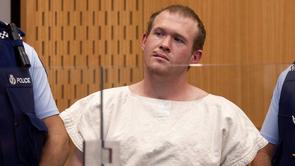 In this March 16, 2019 photo, Brenton Tarrant, the man charged in the Christchurch mosque shootings, appears in the Christchurch District Court, in Christchurch, New Zealand. (MARK MITCHELL / AP)
In this March 16, 2019 photo, Brenton Tarrant, the man charged in the Christchurch mosque shootings, appears in the Christchurch District Court, in Christchurch, New Zealand. (MARK MITCHELL / AP)
WELLINGTON - The sentencing hearing for an Australian man accused of killing 51 Muslim worshippers in New Zealand’s worst mass shooting has been set to begin on Aug 24, the court said on Friday.
Brenton Tarrant pleaded guilty earlier this year to 51 charges of murder, 40 charges of attempted murder and one charge of committing a terrorist act
Brenton Tarrant pleaded guilty earlier this year to 51 charges of murder, 40 charges of attempted murder and one charge of committing a terrorist act.
ALSO READ: New Zealand mosque shooter shocks with switch to guilty plea
Justice Cameron Mander said the hearing is estimated to last three days, but it will take as long as is necessary.
Tarrant has been in police custody since March 15, 2019, when he was arrested and accused of using semi-automatic weapons to target Muslims attending Friday prayers at two mosques in the South Island city of Christchurch. The attack was streamed live on Facebook and cited as providing inspiration for several other attacks targeting religious groups around the world.
Tarrant had planned to fight the charges but changed his plea to guilty in March this year.
Justice Mander said arrangements will be made to allow victims and family members currently based overseas, and unable to travel to New Zealand, to view the sentencing remotely.
New Zealand borders remain shut for foreigners, and New Zealanders returning will have to stay in quarantine for 14 days, as the government looks to limit the spread of the coronavirus pandemic.
READ MORE: NZ bans 'military-style' guns after mosque attacks
Tarrant’s remand was extended to find a suitable date after all COVID-19 restrictions were lifted.
However, waiting for changes to border controls will likely result in a very extended period of delay, Justice Mander said.
“Finality and closure is considered by some as the best means of bringing relief to the Muslim community,” he said.


